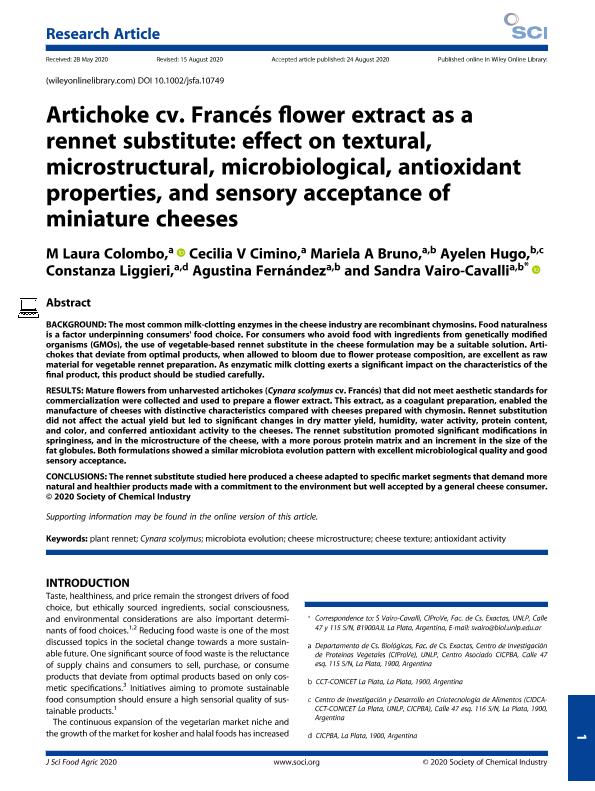Artículo
Artichoke cv. Francés flower extract as a rennet substitute: effect on textural, microstructural, microbiological, antioxidant properties, and sensory acceptance of miniature cheeses
Colombo, Maria Laura ; Cimino, Cecilia Verónica; Bruno, Mariela Anahí
; Cimino, Cecilia Verónica; Bruno, Mariela Anahí ; Hugo, Ayelen Amelia
; Hugo, Ayelen Amelia ; Liggieri, Constanza; Fernández, Agustina
; Liggieri, Constanza; Fernández, Agustina ; Vairo Cavalli, Sandra Elizabeth
; Vairo Cavalli, Sandra Elizabeth
 ; Cimino, Cecilia Verónica; Bruno, Mariela Anahí
; Cimino, Cecilia Verónica; Bruno, Mariela Anahí ; Hugo, Ayelen Amelia
; Hugo, Ayelen Amelia ; Liggieri, Constanza; Fernández, Agustina
; Liggieri, Constanza; Fernández, Agustina ; Vairo Cavalli, Sandra Elizabeth
; Vairo Cavalli, Sandra Elizabeth
Fecha de publicación:
03/2021
Editorial:
John Wiley & Sons Ltd
Revista:
Journal of the Science of Food and Agriculture
ISSN:
0022-5142
Idioma:
Inglés
Tipo de recurso:
Artículo publicado
Clasificación temática:
Resumen
BACKGROUND: The most common milk-clotting enzymes in the cheese industry are recombinant chymosins. Food naturalness is a factor underpinning consumers' food choice. For consumers who avoid food with ingredients from genetically modified organisms (GMOs), the use of vegetable-based rennet substitute in the cheese formulation may be a suitable solution. Artichokes that deviate from optimal products, when allowed to bloom due to flower protease composition, are excellent as raw material for vegetable rennet preparation. As enzymatic milk clotting exerts a significant impact on the characteristics of the final product, this product should be studied carefully. RESULTS: Mature flowers from unharvested artichokes (Cynara scolymus cv. Francés) that did not meet aesthetic standards for commercialization were collected and used to prepare a flower extract. This extract, as a coagulant preparation, enabled the manufacture of cheeses with distinctive characteristics compared with cheeses prepared with chymosin. Rennet substitution did not affect the actual yield but led to significant changes in dry matter yield, humidity, water activity, protein content, and color, and conferred antioxidant activity to the cheeses. The rennet substitution promoted significant modifications in springiness, and in the microstructure of the cheese, with a more porous protein matrix and an increment in the size of the fat globules. Both formulations showed a similar microbiota evolution pattern with excellent microbiological quality and good sensory acceptance. CONCLUSIONS: The rennet substitute studied here produced a cheese adapted to specific market segments that demand more natural and healthier products made with a commitment to the environment but well accepted by a general cheese consumer.
Archivos asociados
Licencia
Identificadores
Colecciones
Articulos(CCT - LA PLATA)
Articulos de CTRO.CIENTIFICO TECNOL.CONICET - LA PLATA
Articulos de CTRO.CIENTIFICO TECNOL.CONICET - LA PLATA
Articulos(CIDCA)
Articulos de CENTRO DE INV EN CRIOTECNOLOGIA DE ALIMENTOS (I)
Articulos de CENTRO DE INV EN CRIOTECNOLOGIA DE ALIMENTOS (I)
Citación
Colombo, Maria Laura; Cimino, Cecilia Verónica; Bruno, Mariela Anahí; Hugo, Ayelen Amelia; Liggieri, Constanza; et al.; Artichoke cv. Francés flower extract as a rennet substitute: effect on textural, microstructural, microbiological, antioxidant properties, and sensory acceptance of miniature cheeses; John Wiley & Sons Ltd; Journal of the Science of Food and Agriculture; 101; 4; 3-2021; 1382-1388
Compartir
Altmétricas



